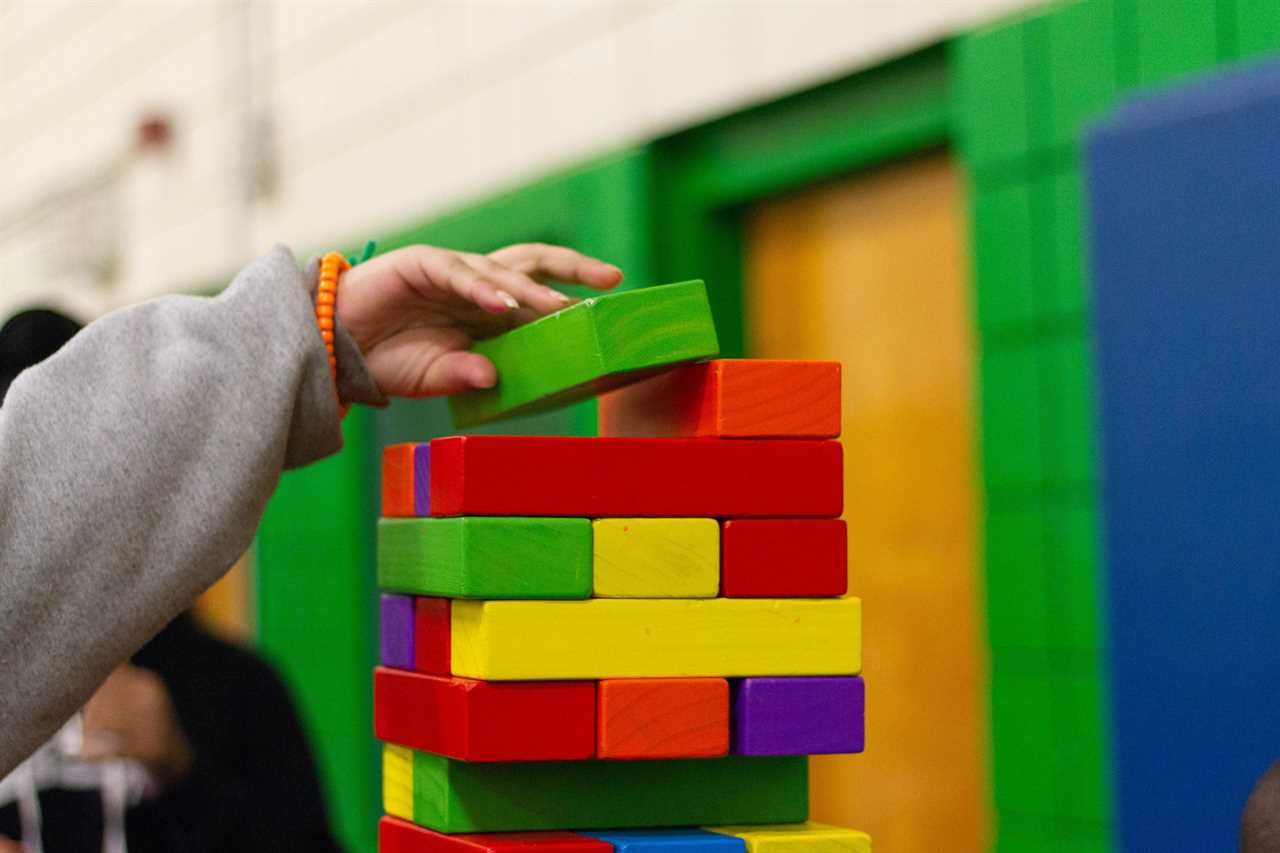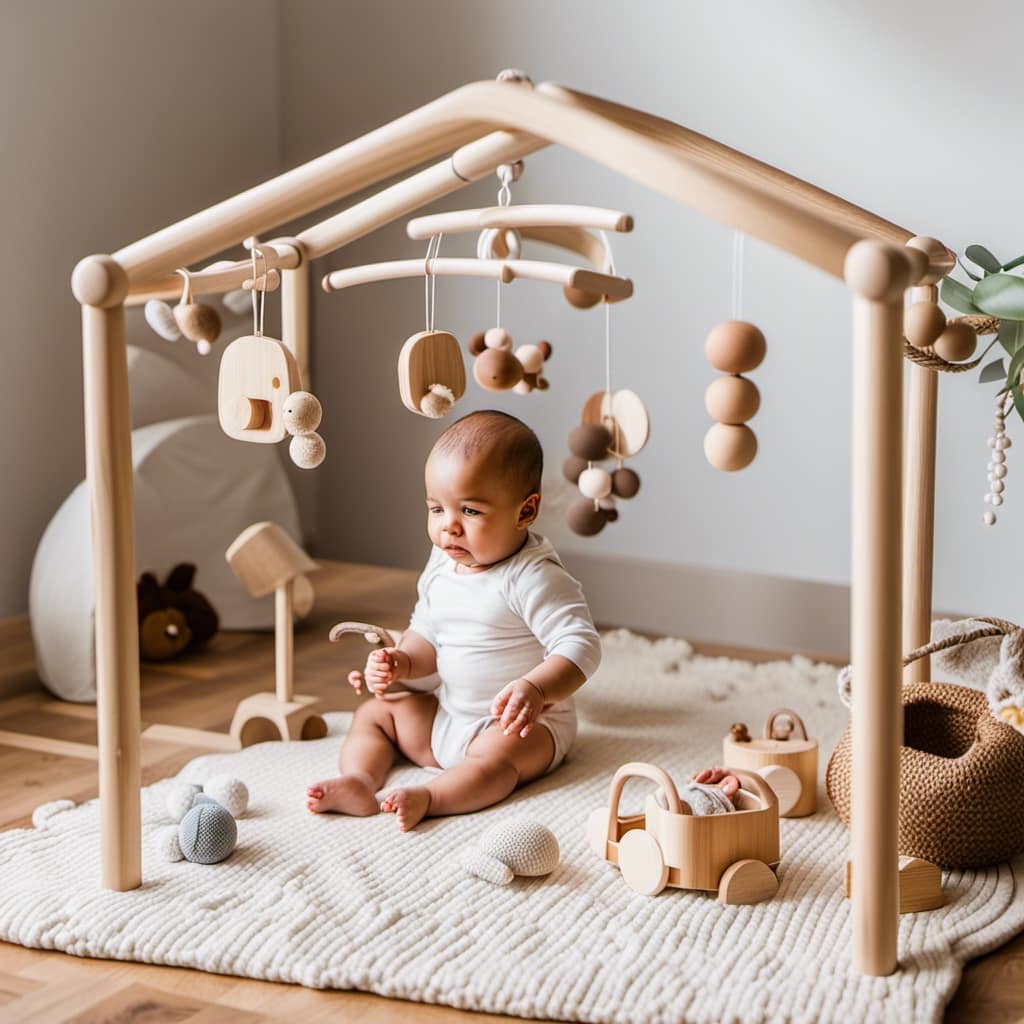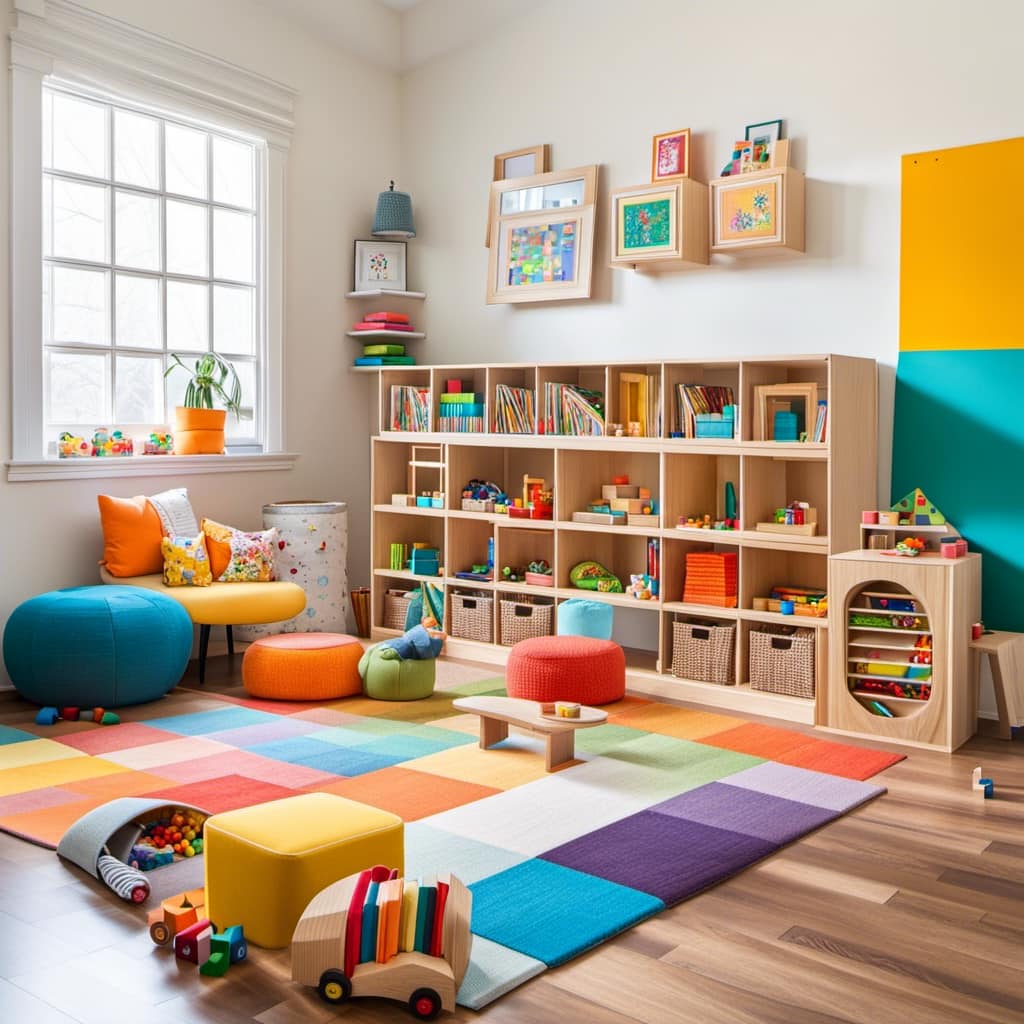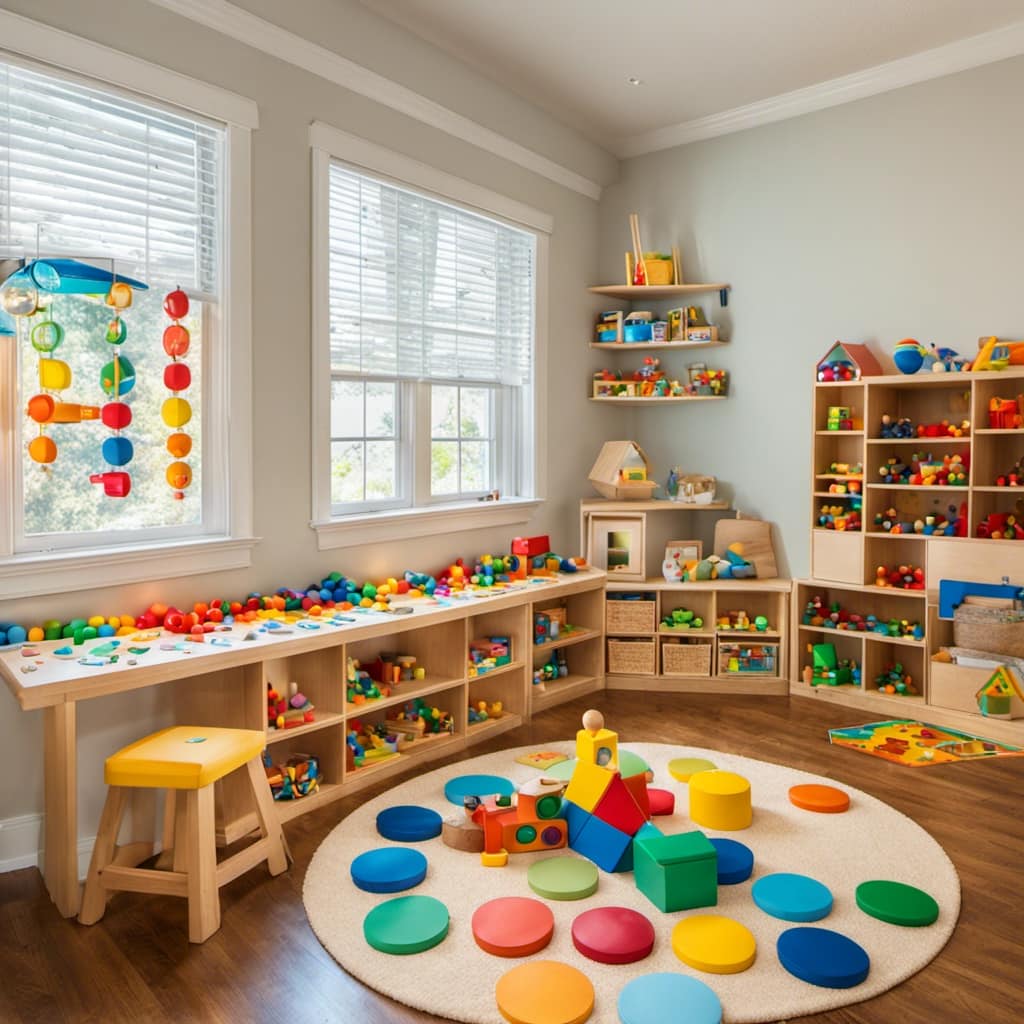As a parent, my main objective is to provide my child with the best opportunities for growth and learning. That is why I am excited to present to you the advantages of Montessori toys in enhancing child development through imaginative play.
These educational toys are designed to stimulate exploration, problem-solving, and concentration. Made from natural materials, they prioritize the safety and well-being of children.
Join me as we explore the benefits of Montessori toys and how they can nurture your child’s imagination, fine motor skills, and independence.
Key Takeaways
- Montessori toys offer multiple ways to play and learn, including shape sorting, stacking, and threading.
- Montessori toys help improve cognitive and spatial intelligence, problem-solving skills, and hand-eye coordination.
- Montessori toys are designed to promote independence, creativity, and imagination in children.
- Montessori toys are made from natural and eco-friendly materials, supporting child-led learning and development.
The Power of Creative Play in Child Development
Creative play is a powerful tool for enhancing child development. It allows children to explore and discover their world in a hands-on and imaginative way. The power of imaginative play in child development cannot be underestimated. When children engage in open-ended play, they have the freedom to use their imagination and creativity to create their own narratives and scenarios.
This type of play encourages problem-solving skills, social interaction, and emotional development. It also helps children develop their cognitive abilities, language skills, and fine motor skills. Exploring the benefits of open-ended play is essential for parents and educators to understand the importance of providing children with the opportunity to engage in creative play.
Unlocking Learning Potential With Montessori Toys
Personally, I’ve discovered that Montessori toys have the incredible ability to unlock a child’s learning potential. The benefits of Montessori toys for toddlers are vast.

These toys promote independence and problem-solving skills, allowing children to learn at their own pace. They foster creativity and imagination, encouraging open-ended play. Montessori toys also serve as tools for sensory exploration and fine motor development.
Through hands-on exploration and discovery, children develop important life skills such as patience and perseverance. What sets Montessori toys apart is that they are made from natural and eco-friendly materials, ensuring a safe and sustainable play experience.
Nurturing Independence and Problem-Solving Skills Through Play
I’ve noticed that when children engage in independent play, they are able to develop problem-solving skills and become more confident in their abilities. It’s amazing to see how promoting independence through play can have such a positive impact on their development.
Here are three key benefits of encouraging independent play:
-
Problem-solving through play: When children are given the freedom to explore and play on their own, they are more likely to encounter and solve problems on their own. This helps them develop critical thinking and problem-solving skills that are essential for their future.
-
Fostering creativity: Independent play allows children to use their imagination and come up with their own ideas. This promotes creativity and helps them think outside the box.

-
Enhancing fine motor skills: Playing independently with toys that require manipulation, such as building blocks or puzzles, helps children develop their fine motor skills. These skills are crucial for activities such as writing, drawing, and self-care tasks.
Inspiring Imagination and Creativity With Montessori Toys
Playing with Montessori-inspired toys sparks imagination and fosters a sense of wonder in children. The benefits of imaginative play for child development are numerous. It allows children to explore their creativity, develop problem-solving skills, and enhance their cognitive abilities.
Montessori toys are specifically designed to foster creativity and imagination in children. These toys encourage open-ended play, where children can use their imagination to create their own scenarios and narratives. By providing children with the opportunity to engage in imaginative play, Montessori toys support the development of important skills such as language and communication, social and emotional intelligence, and critical thinking.
Through play, children can explore different roles, understand various perspectives, and develop a deeper understanding of the world around them. Montessori toys truly inspire children to think outside the box and unleash their creative potential.
Sensory Exploration and Fine Motor Development Through Play
Exploring different textures and manipulating objects has been incredibly beneficial for my sensory development and fine motor skills. Through sensory exploration, I have discovered the importance of engaging my senses to enhance my understanding of the world around me. Here are three key benefits of sensory exploration and fine motor development through play:
-
Improved sensory processing: By engaging in activities that stimulate my senses, such as touching different textures or listening to different sounds, I am able to improve my sensory processing skills. This allows me to better interpret sensory information and respond appropriately.

-
Enhanced fine motor skills: Manipulating objects and engaging in activities that require precise movements, like threading beads or stacking blocks, helps me develop my fine motor skills. These skills are essential for tasks such as writing, dressing, and feeding myself.
-
Increased cognitive development: Sensory exploration and fine motor activities involve problem-solving, critical thinking, and decision-making. These activities stimulate my brain and promote cognitive development, helping me improve my memory, attention, and concentration.
Child-Led Learning: The Montessori Approach
In the previous subtopic, we explored how play can support sensory exploration and fine motor development in children. Now, let’s delve into the concept of child-led learning and the Montessori approach. Child-led learning is at the core of the Montessori philosophy, which emphasizes the importance of allowing children to take charge of their own education. This approach recognizes that each child is unique and has their own interests, strengths, and pace of learning.
To create a visual representation of child-led learning within the Montessori approach, let’s take a look at the following table:
| Child-Led Learning in the Montessori Approach |
|---|
| Respect for the child’s individuality and autonomy |
| Encouragement of self-directed exploration and discovery |
| Provision of a prepared environment that promotes independent learning |
| Focus on hands-on materials and activities that engage the child’s senses |
In the Montessori classroom, children are given the freedom to choose their activities and work on them for as long as they desire. The environment is carefully prepared with Montessori materials that are specifically designed to foster independent learning and cater to the child’s developmental needs. This child-led approach promotes a love for learning, builds self-confidence, and encourages critical thinking and problem-solving skills.
Concentration and Focus: The Benefits of Montessori Toys
I have noticed that concentration and focus greatly improve when using Montessori toys. These toys have numerous benefits for enhancing cognitive skills through play. Here are the key advantages:

-
Improved Concentration and Focus: Montessori toys are designed to engage children in hands-on exploration and discovery, which promotes sustained attention and concentration.
-
Enhanced Cognitive Skills: These toys offer opportunities for problem-solving, spatial intelligence development, and critical thinking, all of which contribute to cognitive growth.
-
Development of Life Skills: Montessori toys help children develop important life skills such as patience, perseverance, and independent thinking.
Research has shown that play is a crucial aspect of child development. By incorporating Montessori toys into playtime, children can foster their concentration and focus while simultaneously enhancing their cognitive abilities.
It is through these toys that children can learn and grow in a fun and engaging manner.
Life Skills and Eco-Friendly Materials: Why Montessori Toys Stand Out
Using eco-friendly materials, Montessori toys stand out by promoting the development of important life skills. These toys are not only fun and engaging, but they also provide children with the opportunity to learn and grow in various areas. One of the key benefits of Montessori toys is their focus on sustainable materials. By using natural and eco-friendly materials, these toys not only contribute to a healthier environment but also teach children about the importance of being mindful of the world around them. Additionally, Montessori toys help children develop essential life skills such as problem-solving, communication, and fine motor skills. Through hands-on play, children learn how to think critically, work collaboratively, and explore their creativity. By incorporating sustainable materials, Montessori toys not only benefit the child’s development but also instill a sense of responsibility towards the planet.

| Montessori Toy Benefits | Sustainable Materials |
|---|---|
| Promotes life skills | Eco-friendly |
| Develops problem-solving skills | Natural materials |
| Enhances communication skills | Mindful of the environment |
| Builds fine motor skills | Responsible consumerism |
| Fosters creativity and imagination | Sustainable production methods |
Frequently Asked Questions
How Do Montessori Toys Promote Social and Emotional Development in Children?
Montessori toys promote social and emotional development in children by providing opportunities for open-ended play, fostering independence and problem-solving skills, and encouraging creativity and imagination. Play is crucial in developing social and emotional skills.
Are Montessori Toys Suitable for Children With Special Needs?
Yes, Montessori toys are suitable for children with special needs. Inclusion is important, and these toys can support their sensory development. Research shows that Montessori principles promote independence and self-confidence in all children.
What Age Range Are Montessori Toys Recommended For?
Montessori toys are recommended for a wide age range, typically from infancy to early childhood. They offer numerous benefits, such as promoting play-based learning, inclusivity, and development in educational settings.
Can Montessori Toys Be Used in a Classroom or Group Setting?
Yes, Montessori toys can be used in a classroom or group setting. They offer numerous benefits such as promoting independent learning, fostering creativity, and improving social skills through collaborative play.
Are There Any Specific Safety Guidelines for Using Montessori Toys With Children?
There are specific safety guidelines for using Montessori toys with children. These toys promote independence, problem-solving, and creativity. They should be made from natural and eco-friendly materials, and age-appropriate for safe play.
Conclusion
In conclusion, Montessori toys serve as the key to unlocking a child’s full potential through the power of creative play.

Like a compass guiding them on a magical journey, these toys nurture independence, problem-solving skills, and imagination.
They provide a sensory-rich environment that fosters fine motor development and ignites the flame of curiosity.
With a child-led approach, Montessori toys promote concentration and focus, setting the stage for lifelong learning.
Moreover, their use of eco-friendly materials instills important life skills and a sense of responsibility for our planet.
So let the adventure begin, as Montessori toys pave the way for endless growth and development.










